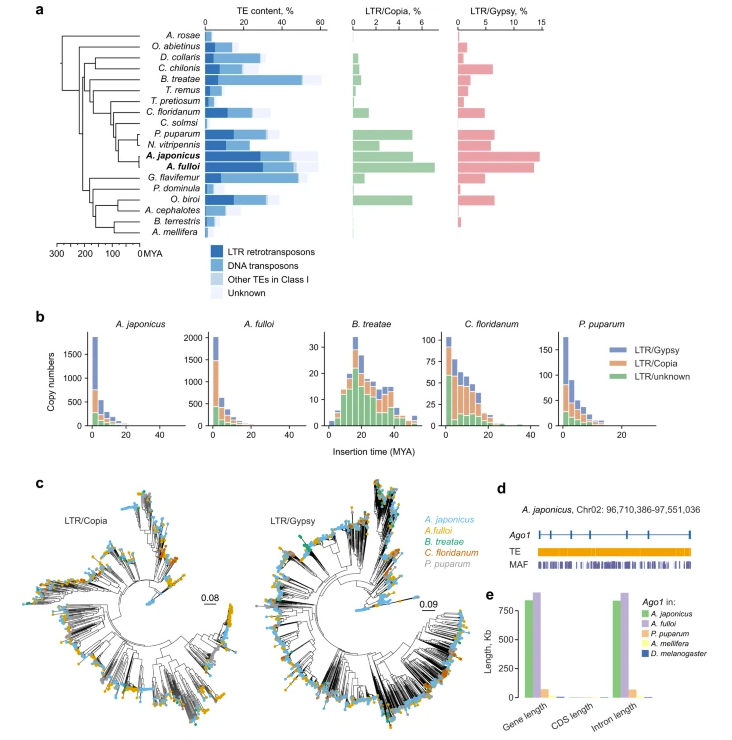Parasitoid wasps are an extremely diverse group of insects that are ideal models for the study of evolutionary biology. Genome sequencing and assembly has revealed that the genome size of two species of Anastatus wasps, A. japonicus and A. fulloi, is approximately 950 Mb, which is two to four times larger than the genome of most currently known hymenopteran insects. Further studies suggest that the large genome profile of Anastatus wasps is related to the recent spread of LTR -like transposons. At the same time, the researchers found that a large number of intact transposable elements are present in the bee's genome, which could mean that these elements are still transposable and pose a threat to genome stability.

Recently, Professor Fei Wu from Shanghai Institute of Advanced Study, Zhejiang University, and College of Computer Science and Technology, Zhejiang University and collaborators conducted research to explore this. They examined the evolutionary features of the genome in response to these potential threats to genome stability and found that piRNA-related Piwi genes were highly amplified and strongly expressed at all developmental stages and tissues. In addition, the authors combined data from small RNA sequencing to further confirm the repressive effect of piRNA on transposons. They also examined the rapid evolution of venom genes from two Anastatus wasps and found that the evolutionary models of co-option and neofunctionalization after gene duplication together shaped the rapid evolution of Anastatus wasp venom, with co-option playing an important role. In addition, the study also identified a large number of functional genes other than venom genes that are co-expressed with venom genes, and showed that these genes other than venom genes may also play an important role in the rapid evolution of venom.

In conclusion, this study reveals the evolutionary strategy of genome of parasitoid wasps in response to unexpected transposon outbreaks. This may help to further investigate the molecular mechanisms maintaining genome stability and has important implications for a deeper understanding of the evolution of genome size. At the same time, the discovery of rapid evolution of venom in parasitic wasps refines the evolutionary model of venom genes and is valuable for a deeper understanding of the emergence of new gene functions.

The research was jointly conducted by a multidisciplinary team with backgrounds in evolutionary genomics, bioinformatics, and entomology, fully reflecting the interdisciplinary features. Dr. Xinhai Ye from Shanghai Institute of Advanced Study, Zhejiang University and Professor Fei Wu from Shanghai Institute of Advanced Study, Zhejiang University, and College of Computer Science and Technology, Zhejiang University participated in the research.
This work is published in Nature Communications and could be accessed at Genomic signatures associated with maintenance of genome stability and venom turnover in two parasitoid wasps | Nature Communications.
About Professor Fei Wu
Fei Wu received his B.Sc., M.Sc. and Ph.D. degrees in computer science from Lanzhou University, University of Macau and Zhejiang University in 1996, 1999 and 2002 respectively. From October, 2009 to August 2010, Fei Wu was a visiting scholar at Prof. Bin Yu's group, University of California, Berkeley. Currently, He is a Qiushi distinguished professor of Zhejiang University at the college of computer science. He is the vice-dean of college of computer science, and the director of Institute of Artificial Intelligence of Zhejiang University.
He is currently the Associate Editor of Multimedia System, the editorial members of Frontiers of Information Technology & Electronic Engineering. He has won various honors such as the Award of National Science Fund for Distinguished Young Scholars of China (2016).
His research interests mainly include Artificial Intelligence, Multimedia Analysis and Retrieval and Machine Learning.
About SIAS
Shanghai Institute for Advanced Study of Zhejiang University (SIAS) is a jointly launched new institution of research and development by Shanghai Municipal Government and Zhejiang University in June, 2020. The platform represents an intersection of technology and economic development, serving as a market leading trail blazer to cultivate a novel community for innovation amongst enterprises.
SIAS is seeking top talents working on the frontiers of computational sciences who can envision and actualize a research program that will bring out new solutions to areas include, but not limited to, Artificial Intelligence, Computational Biology, Computational Engineering and Fintech.

